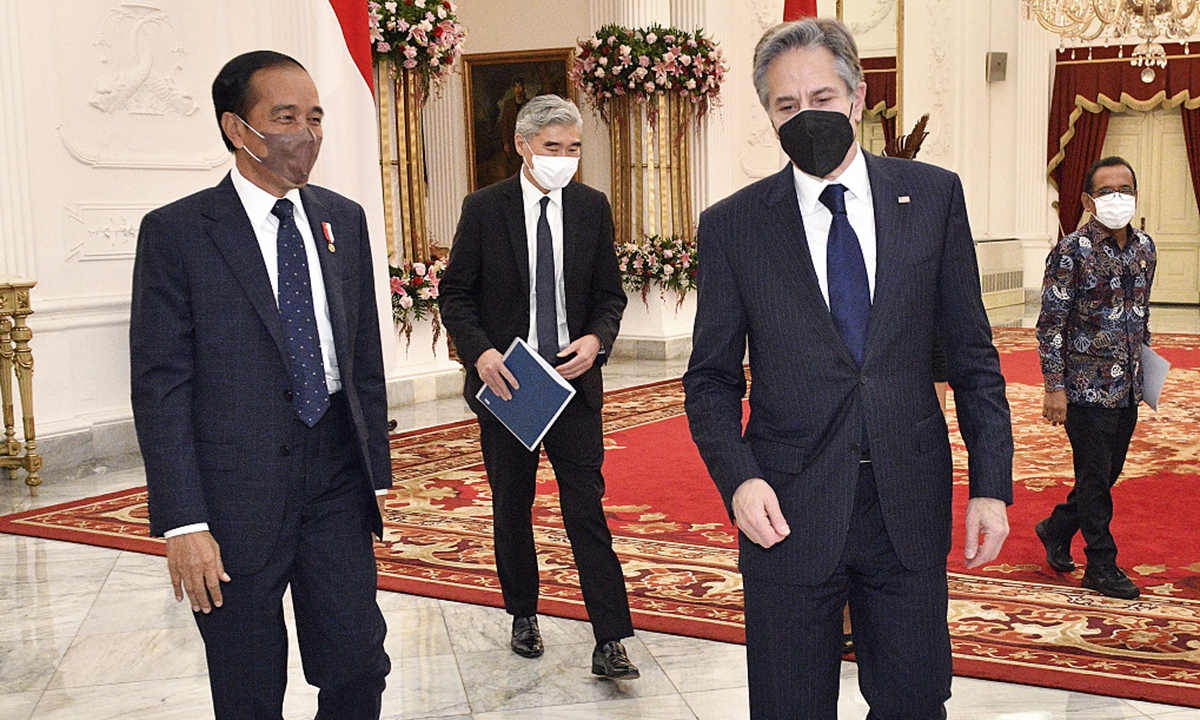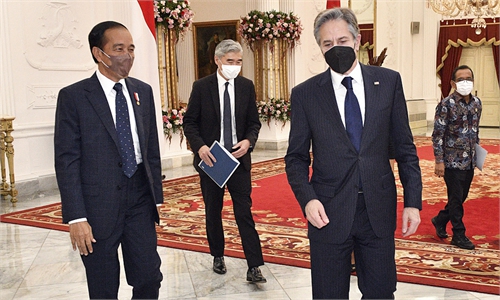
Indonesian President Joko Widodo (left), walks with US Secretary of State Antony Blinken. Photo: VCG
US Secretary of State Antony Blinken on Tuesday delivered a speech in Indonesia, the first stop of his Southeast Asian tour, to promote "the US commitment to the security and prosperity of the Indo-Pacific." He once again hypocritically elaborated on the concept of a "free and open Indo-Pacific," claiming that the US will defend the rules-based order, and its goal is" not to keep any country down. Rather, it's to protect the right of all countries to choose their own path, free from coercion, free from intimidation." He also said the US hopes to avoid conflicts in the Indo-Pacific region.Blinken's glib talk sounds as sweet as a song. He gave full play to Western politicians' tactics of using "noble vocabularies" to deliver strategic maliciousness. Look at how mainstream Western media interpreted Blinken's Southeast Asia visit and his speech. The AFP reported that Washington seeks to bolster alliances against China's growing power. The Guardian also made similar comments. Reuters, BBC and many other media outlets said Blinken's visit showed that Southeast Asia has become a "key battlefield" for China-US competition. Bloomberg's report was headlined "Blinken Blasts China, Seeks to Rally U.S. Allies in Asia."
China's rapid development has injected a strong impetus into the prosperity of Southeast Asia. As a result, China has become the largest trading partner of almost all Southeast Asian countries, and China's investment in those countries has also increased sharply. The expansion of China's influence in Southeast Asia is a natural process, a collateral product of the expansion of cooperation, and is geographically inevitable. Although China has maritime disputes with Vietnam and the Philippines, and some regional countries have security concerns about China's rise, these have not affected the overall situation of China's deepening cooperation with ASEAN members.
From the pivot to the Asia-Pacific to the current Indo-Pacific Strategy, the US has been promoting purely geopolitical plans. Washington has greatly increased its military presence in the South China Sea, expanded its visibility in the region, and intervened in the political process of the region. All these acts are aimed at China and intend to suppress China's rise.
In other words, the cooperation between China and Southeast Asian countries is a purpose in itself. China-ASEAN cooperation constitutes the true foundation and driving force of regional prosperity. However, the US has come to engage in cooperation with the wrong intention. It is to destroy the original development and cooperation ecology of the region, drive a geopolitical wedge into it, and try to turn geopolitics into the main theme of international relations in the region.
Everyone across the world is aware of this. Everyone knows that the US wants to make Southeast Asia a strategic barrier to contain China. Although the US is hyping slogans such as "democracy," "rules" and "freedom," what it actually does is to expand the rifts and suspicions in the region, and attempt to amplify every dispute. What the US most hopes to see is chaos in the region, in a bid to increase its deep involvement in the region and create dependence of regional countries on it.
China sees Southeast Asia from the perspective of development and good-neighborliness, while the US perceives the region from the perspective of global strategy. If this is a "prescribed practice" for the US, as a superpower, to maintain its hegemony, it is of little significance to make value judgments. But it is necessary for regional countries to keep their eyes open to understand what the US is pursuing and what consequences it may trigger, in a bid to prevent a destructive effect generated by US policies.
It is understandable that Southeast Asian countries have some concerns in the face of China's rise, and they are willing to see the US, an outside country, play a balancing role in the region. The US is like a sleeping pill. Taking a little less or taking half a tablet will make some people sleep more peacefully.
However, the side effects of sleeping pills are real. Overindulgence leads to strong dependence, then causes harm by going from taking half a pill to one, or even two. Southeast Asian countries need to work with China to maintain a positive neighborhood and promote healthier relations in a way that benefits all parties and the region. The region cannot be controlled by the US-provided sleeping pills, which are in essence opium.
No country in the region is being coerced by China, with their political systems and economic development models completely independent of China. Rather, it's the US that is constantly trying to influence the development path of Southeast Asian countries, acting as the largest external force in the internal affairs of countries in the region.
The region demands capabilities to manage US presence and make it as innocuous as possible. US "dominance" in the region must be avoided, since if that happens, all the regional countries would become tools of the US to achieve its global interests.

